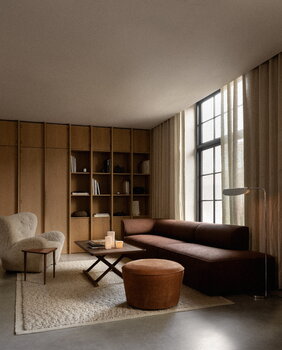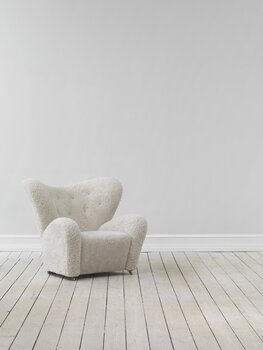Audo Copenhagen’s The Tired Man, designed by the Danish architect Flemming Lassen, is a voluminous easy chair upholstered in white, genuine sheepskin. The Tired Man was first introduced at the Copenhagen Cabinetmakers’ Guild Competition in 1935. According to Flemming Lassen, sitting in the chair should feel ”as warm and safe as a polar bear cub in the arms of its mother in the middle of the ice cap”. The soft and imposing armchair invites you to spend relaxed moments and enjoy the timeless feeling and quality of Danish design.
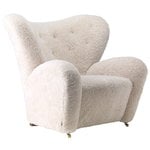
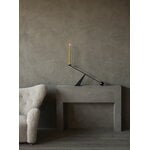

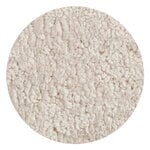
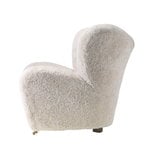
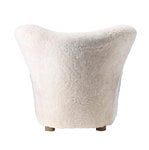
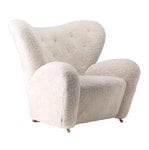
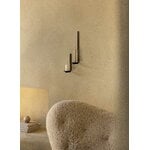
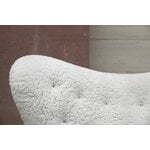
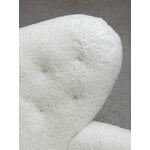

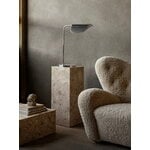
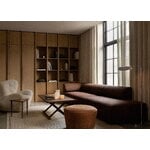

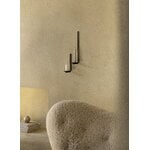
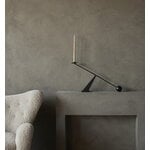
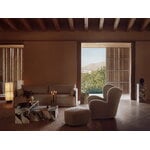


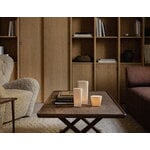
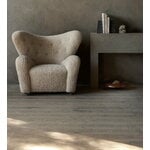
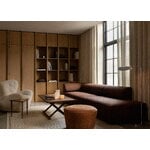
The Tired Man armchair, Moonlight sheepskin
Audo Copenhagen
Description
Audo Copenhagen’s The Tired Man, designed by the Danish architect Flemming Lassen, is a voluminous easy chair upholstered in white, genuine sheepskin. The Tired Man was first introduced at the Copenhagen Cabinetmakers’ Guild Competition in 1935. According to Flemming Lassen, sitting in the chair should feel ”as warm and safe as a polar bear cub in the arms of its mother in the middle of the ice cap”. The soft and imposing armchair invites you to spend relaxed moments and enjoy the timeless feeling and quality of Danish design.
Product details (12)
- Colour
- Light beige
- Width
- 102 cm
- Height
- 88 cm
- Seat height
- 38 cm
- Upholstery fabric
- Moonlight sheepskin
- Base material
- Smoked oak
- Leg height
- 5.5 cm
- Frame material
- Wood particleboard, wood fiberboard, plywood, non-polygraphic cardboard
- Suspension system
- Pocket spring
- Seat cushion
- Polyester wad
- Backrest cushion
- Polyester wad
- Weight
- 37 kg
- Product ID
Designer
Flemming Lassen (1902-1984) was a Danish architect and one of the pioneers of Danish functionalism. He is best known for his buildings designed in collaboration with Arne Jacobsen as well as his internationally renowned furniture, some of which have been relaunched by the design company By Lassen founded by Lassen’s relatives. Perhaps the best known of Flemming Lassen’s designs is The Tired Man chair designed in 1935 for a competition held by the Copenhagen Cabinetmakers’ Guild.
Born into an artistic family, Flemming Lassen knew already at a young age that he wanted to become an architect, as did his brother Mogens. Flemming’s international breakthrough came at the end of 1920s when he won a competition held by the Federation of Danish Architects with his design for the House of the Future created in collaboration with Arne Jacobsen. The two continued their partnership also later in their careers.
View all productsReviews (0)
Sustainability
The Product Sustainability Framework, our criteria of sustainable design, helps you find the most sustainable products in our selection. Read below which sustainability criteria this product has met.
Working conditions & labour 7/9
-
Equal opportunities for all employees
-
Commitment to UN Global Compact, fair compensation for all employees
-
Corporate responsibility requirements defined and communicated for suppliers
-
Systematic work for improved inclusion and well-being in the workplace
-
Transparent supply chain
-
Suppliers' compliance to a code of conduct ensured
-
Compliance to the UN Guiding Principles on Business and Human Rights ensured in the supply chain
-
Direct suppliers audited and certified
-
Support for community involvement in the supply chain
Eco-friendly production 8/9
-
Fair and resource-wise water-use in production
-
No incineration or landfilling of returned items
-
No use of endangered species as materials
-
No direct environmental emissions or waste (excl. GHGs) from production
-
The sustainability of direct suppliers' production is addressed and monitored
-
Production and material sourcing that respect biodiversity, animal rights, and natural ecosystems
-
Material-efficient and ecological packaging
-
No potentially harmful chemicals used in own production
-
Positive impact on nature’s well-being through operations that regenerate natural ecosystems
Climate impact 4/8
-
Company's direct greenhouse gas emissions identified and commitment to reduction
-
Product's carbon impact identified and commitment to reduction
-
Guidance on energy- and eco-efficient use of the product
-
Carbon footprint of the product calculated and goals set to reduce it
-
Contribution to climate initiatives beyond the brand’s direct operations
-
Low-carbon or compensated transportation
-
100 % renewable energy in own production and operations
-
Carbon neutral or carbon negative product
Sustainable materials 5/6
-
Sustainable and long-lasting material choices
-
No harmful or hazardous substances
-
Responsible raw material sourcing and production
-
Ecological materials: natural, biodegradable, recyclable or recycled contents
-
Outstanding materials in terms of innovativeness, responsibility, sustainability and circularity: local production or sourcing, 100 % recycled content, C2C-certification etc.
-
Materials suited for circularity: monomaterials, recyclable finishings, renewable or recycled contents etc.
Circular design 4/5
-
High aesthetic quality promoting long-term use of the product
-
Technically durable product design and material choices
-
Design for enduring life-long quality
-
Design and support for product maintenance, repair and upgradability
-
Innovative circular design solutions: circular service system, resale platform, remanufacturing, collection of used products, etc.












